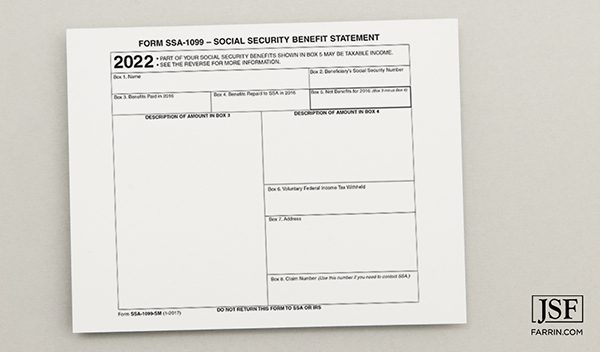
And with the new year comes a new tax season. The deadline to file taxes is April 15, but the months leading up to April can pass by quickly. It is important to start getting your tax information together now so you have enough time to prepare thoroughly and file by the deadline if your income level exceeds the threshold.
Is SSDI Taxable?
Your SSDI benefits may be taxable. To determine if and when your Social Security Disability benefits are taxable, you need to understand how much SSDI you received and what your total income was for the year.
If you are in certain income brackets, you may have to pay federal income taxes on the Social Security Disability benefit money you received. Part of your Social Security Disability benefits may be taxed if:
-
- You are single, and your annual total income* is more than $25,000.
-
- You are married, and you and your spouse have an annual total income* of more than $32,000.
*Annual total income equals one-half of your SSDI plus all other income.
How Much SSDI Is Taxable?
Use the following charts as your SSDI taxable income calculator for determining how much of your SSDI is taxable:
| Annual Total Income* of Individual | Maximum Portion of SSDI to be Taxed |
| Under $25,000 | 0% |
| $25,001 – $34,000 | 50% |
| Over $34,000 | 85% |
| Annual Total Income* of Married Couple | Maximum Portion of SSDI to be Taxed |
| Under $32,000 | 0% |
| $32,001 – $44,000 | 50% |
| Over $44,000 | 85% |
*Annual total income equals half of your SSDI plus all other income.
The more income you have individually or as a married couple, the more likely you will have to pay taxes on Social Security Disability benefits. In terms of the actual tax rate that’s applied to these benefits, the IRS uses your marginal tax rate, which is the tax rate paid for each additional dollar of income. This rate ranges from 10% to 37%.
Paying Your SSD Taxes: Two Ways to Get Your SSA 1099

If you have not received your SSA1099, here are two ways to get it.
1. Access Your Social Security Benefits Info Online
-
- Go to the Social Security Website’s my Social Security page.
-
- Click on the “Create an Account” or “Sign In” button.
-
- Log in.
-
- Select the “Replacement Documents” tab for your 1099.
If you want to keep track of your earnings each year, you can also use your personal my Social Security account for that as well.
2. Call the Social Security Office
You can obtain a replacement benefits statement by calling the main Social Security office at 1-800-772-1213 or by calling your local Social Security office.
Does the SSA Take Taxes Out of My Social Security Disability Benefits?
The SSA does not automatically take taxes out of your Social Security Disability benefits. However, you can request that it withhold taxes if you are worried about putting away enough to pay these taxes at the end of the year. In order to do this, you will need to contact your local Social Security Office to set up tax withholding arrangements.
Why Do I Have to Claim SSDI on My Taxes?
The IRS will receive a copy of your SSA 1099 form, and it could charge you a financial penalty if you don’t claim SSDI correctly on your taxes. If your income level puts you into a category of having to pay taxes on your SSDI benefits, and you do not claim your SSDI benefits when you file, the IRS will likely send you a CP2000, or Underreported Income notice. The CP2000 could propose additional tax, fines, and interest on your benefits and any other unreported income.
Do SSDI Recipients Have to File Taxes?
Not all SSDI recipients have to file an income tax return. The IRS has an Interactive Tax Assistant that can be completed in approximately 12 minutes that will help you determine if you need to file a tax return.
At the Law Offices of James Scott Farrin, we have an entire Social Security Disability department dedicated to helping disabled workers in North Carolina with their SSDI claims. If you need to apply or have been denied Social Security Disability, call us at 1-866-900-7078 or contact us online for a free case evaluation.
This blog is not intended to constitute legal advice or written tax advice within the meaning of IRS Circular 230 §10.37. The author intends by this communication to share general information for discussion purposes only, and you should not interpret the statements otherwise.
You May Also Be Interested In
If My NC Social Security Disability Claim Is Approved, How Much Will I Receive Per Month?
Social Security Disability Attorney Rick Fleming Answers Client Concerns
What Is Backpay in the Context of Social Security Disability?



